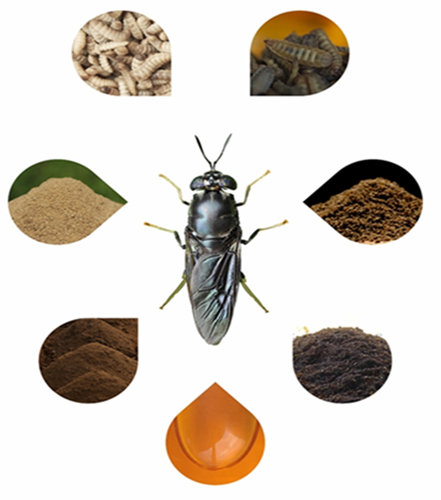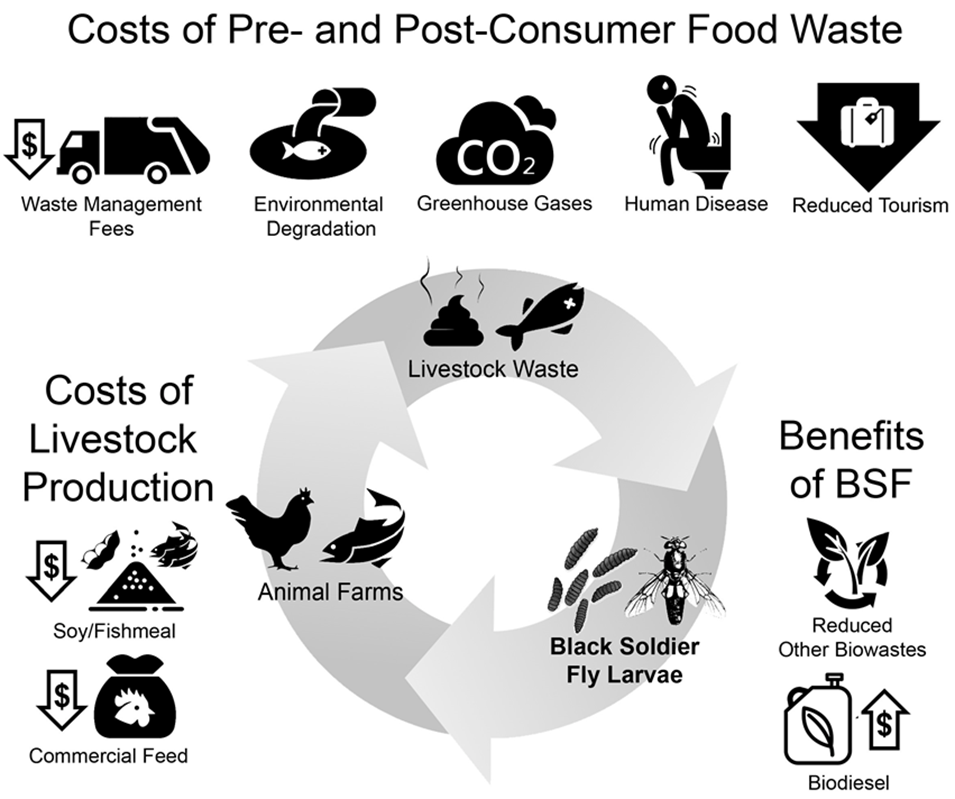
Closed Loop Use Fly Fertilizer (BSF) to recycle organic waste.

Organic waste is the largest component of landfills in both developed and developing countries. This includes both inedible parts of crops or animals, waste from the production and food processing, unsold food, and catering waste. Waste varies greatly in composition. Wastes vary greatly in composition, e.g., sugarcane cake, coconut husks, coffee grounds, peelings of fruits and vegetables, overripe market fruits, cattle that have died of disease, by-products, blood, etc. The accumulation of organic waste has a serious negative impact on the environment. It is a breeding ground for pathogenic microbes such as Salmonella and Enterococcus, as well as dirty flies such as cadaver flies and house flies, some of which can carry these pathogens to humans and have been linked to outbreaks of intestinal diseases. Such flies spread pathogens from bacteria and viruses to protozoa and include Escherichia coli, Chlamydia trachomatis (blinding trachoma), Clostridium difficile (agent of enterocolitis), Cryptosporidium parvum (cryptosporidiosis), Antamoesenyirus hystolytica polio), Salmonella typhii (typhoid typhoid fever), Shigella sp. (bacterial dysentery), Treponema pallidum (yaws), hepatitis A and E viruses, and Vibrio cholerae (cholera). Some of these diseases can be controlled with vaccines, but sanitation is the the primary and only form of prevention. Pathogens, pesticides, heavy metals, and other toxins from waste leach into the groundwater and onto farmland, contaminating it. On an economic level. waste management requires money and resources to collect waste, transport it, and recycle it by incineration composting or, most often, landfilling. Food waste represents a loss of resources, from those that are used to produce discarded food, to the nutrients in the waste that are not used.
A global solution to this environmental problem on a global scale could be the use of the black soldier fly (BSF), an insect whose larvae eat any organic waste.
The BSF, unlike other flies, does not spread disease. The larvae do not accumulate pesticides, pharmaceutical compounds, mycotoxins and heavy metals. The digestive capacity of BSFs is the strongest of all insects: they can digest literally any organic matter soft enough to to be chewed. Black soldier fly (BSFL) larvae can be reared on manure, feces, cadavers, food waste and agricultural waste, including lignocellulosic waste that cannot be converted to biofuel, and wastes with high alkaloid content or other compounds that are not suitable for composting. Compared to other forms of composting, BSF bioconversion produces fewer greenhouse gases and has lower global warming potential.
Reducing waste means fewer disease-carrying flies, less pollution environment, less money spent on waste disposal, less landfill overflows, etc.
The adult insects do not have a complete digestive system (they only consume moisture), and cannot carry diseases such as malaria or dengue fever, HIV or SARS-CoV-2. Insects are sources of of many different natural substances, such as chitosan and bioactive compounds, antimicrobial peptides which can be used for medical, veterinary and agricultural purposes. The FAO and the UN in their recommendations believe that these insects can be a safe means of enhancing food food security, by replacing traditional animal nutrition, thereby reducing financial and environmental costs.
The black soldier fly (BSF) has great potential. The fly`s larvae are capable of digesting any organic substances, increasing their own weight by hundreds of times in a short period of time, 12-14 days. Insects and their larvae at all life stages are rich sources of protein, fat, and many other important nutrients and can be used as feed for pets, fish, poultry, and swine, both fresh as well as processed into a feed comparable to fish meal or soybean meal, or even used to produce biofuel. In this way, the fly not only eliminates waste, but can also increase the sustainability of livestock production. The attention given to insect breeding - by the media, the UN, the FAO, entrepreneurs and researchers - is growing exponentially. Much of that attention focuses on their sustainability compared to vertebrate meat: they require an order of magnitude less feed, water, and land than mammals or birds per gram of protein, and produce just as much less waste and CO2. Insect meal is less destructive to the environment and often cheaper than other ingredients in animal feed, namely soybean meal and fish meal. Insects can be bred on organic byproducts from food products, food waste, food waste, and animal waste. Recovery of nutrients from food waste waste into edible insect biomass increases the value of the waste and returns nutrients to the food cycle, reducing the cost of food production both financially and environmentally. Similar to just as manure can be used to grow plants fed to manure producers, so too insects can be fed to the same organisms that produced the waste on which the insects were grown. BSF bioconversion creates a very desirable closed nutrient cycle.
The insects can even be turned into biodiesel, reducing the financial and/or energy costs of of producing biofuels from raw waste and helping to combat global climate change. It is expected that the use of insects as a means of reducing waste would bring the same or greater economic value than their use as food or feed, and so many countries around the world are are exploring insect-based bioconversion: converting organic waste into useful substances. BSF themselves produce little waste that is used as a fertilizer product. In this way, BSFs can convert waste into hygienic compost and high-quality animal feed, reducing the financial and environmental costs for both waste management and raising livestock.
The use of insects in bioconversion is not uniform around the world. Different countries produce different waste, have different laws regarding insects as food or feed, and have different infrastructure for waste management and use of bioconversion products. Composting is popular in Europe, where large amount of waste is turned into fertilizer by microbes, but the process is slow, requires However, the process is slow, requires large amounts of space, and cannot treat all types of waste. Insect recycling is cheaper and less technically demanding than using systems such as anaerobic digestion and requires less land than open microbial composting, and therefore has significant potential for developing countries.
So insect breeding on waste solves several problems at once-environmental and food.
Farms and BSF breeding facilities are being established around the world to process organic waste into animal feed animals with economic and environmental benefits. Many nations can greatly benefit from BSF breeding to solve the many problems they face in large part because of overpopulation, urbanization, and climate change. The systems can be adapted for both large-scale municipal composting as well as for smaller sizes for individual livestock farms or even urban households.
The prospects for BSF are such that BSF can rival the honeybee and mulberry silkworm as the most economically significant domesticated insects. Much of the world could benefit from BSF.
According to a new market research report titled "Black soldier fly market by product type (Protein meal, whole dried larvae, oil, biofertilizer, live insects, chitin/chitosan), uses (Animal feed, agriculture, pet food, pharmaceuticals and cosmetics) and "Geography - Global Forecast to 2030" published by Meticulous Research®, the global market black soldier flies will grow at a compound annual growth rate of 33.3% from 2019 to 2030 to reach $2.57 billion by 2030.
Fish and soybean meal are major current sources of protein for feed, but these sources compete with human food production. Moreover, the availability of fish meal has become limited due to overexploitation of marine resources, resulting in a rapid increase in the cost of these feed ingredients. As a result, the search for environmentally friendly alternatives has led to a growing interest in insects as a feed ingredient. Insects have high protein levels and their production takes little space. Massively bred insect species, such as the black soldier fly, have attracted considerable attention mainly mainly because of BSF`s ability to convert organic waste into high-quality nutrients and developed a commercial protein meal product. BSF`s rapid market growth has been attributed to the increasing global demand for meat, the growth of the aquaculture industry, increased demand from the feed industry for alternative proteins due to rising prices of soybean meal, growing government support for the use of insect meal in livestock feed, and increased investment by key players in the BSF industry.
Products made from BSF larvae-protein meal, biofertilizer (frass), whole dried larvae, oil larvae, chitin and chitosan. In value terms, protein meal has the largest share, which is due to increased demand for protein meal from animal feed producers, rising prices of soybean meal and government support - the approval of the use of insect meal in animal feed and pets.
Geographically, the Asia-Pacific region accounts for the largest share of the overall black soldier fly market. This is due to the growing consumption of meat and seafood, the growth of the aquaculture industry, increased awareness of BSF as an alternative protein source for use in feed, lack of regulatory impediments and rising fishmeal prices. During the forecast period, Europe and the U.S. will see rapid growth, primarily due to government approvals for BSF in animal feed and pet food, growing funding and investment in the black soldier fly industry, the presence of a large number of startups. Prices for BSF products have doubled in the past few years due to growing demand for BSF products, due to the approval of use in pet food. In North America and Europe black soldier fly prices are high compared to Asian countries, especially South Korea, Japan, Malaysia, and Vietnam because production costs are higher in these regions due to the high labor and land costs. Moreover, the prices of BSF products in the U.S. are higher compared to European countries, mainly because of the standardized regulatory framework and the low level of BSF production units compared to Europe.
Fly Market Black Soldier products
- Protein Flour.
- Biofertilizer (Frass)
- Dried whole larvae
- Oil of larvae
- Chitin/Chitosan
Investments from key players operating in the global black soldier fly market, which are AgriProtein (South Africa), Bioflytech (Spain), Enterra Feed Corporation (Canada), Entobel (Vietnam), Entofood (Malaysia), Entomo Farm (France), EnviroFlight (USA), Hexafly (Ireland), F4F (Chile), Hermetia GmbH (Germany), InnovaFeed (France), Protenga (Malaysia), and Protix (the Netherlands)-are over $5 billion. The average check from $5 million; the largest check is $600 million.
The BSF grub technology has incredible promise as a means of converting organic waste into environmentally friendly and cheap animal feed, human medicine, and as a highly profitable export resource, solving several environmental and social problems at once. All States will benefit from BSF bioconversion, mainly as a means of solving global environmental and social problems.
